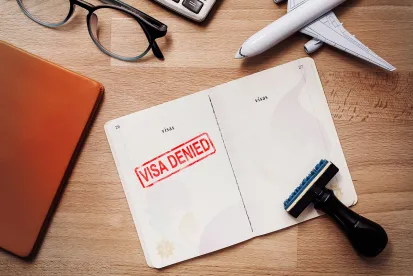On June 22, 2020, President Donald J. Trump issued the latest Proclamation on Immigration in a series of proclamations limiting travel and immigration to the United States. Effective June 24, 2020 and until at least December 31, 2020, H-1B, H-2B, J and L nonimmigrants who are outside the United States on June 24, 2020 and who do not have a valid visa or a valid travel document, such as a transportation letter, boarding foil or an advance parole will not be permitted to travel to the United States. This proclamation cites the economic impact of COVID-19 on U.S. workers as the justification for limiting competition from foreign workers. It further notes that the ban will be periodically reviewed and may be extended.
Specifically excluded from the Proclamation are:
-
Lawful Permanent Residents (green card holders) of the United States;
-
Spouses or children of a United States citizen;
-
Foreign nationals entering the United States to provide temporary labor or services essential to the United States food supply chain; and
-
Foreign nationals whose entry is in the national interest as determined by the Secretary of State, the Secretary of Homeland Security, or their representatives.
The Proclamation orders the Secretary of State, the Secretary of Labor and the Secretary of Homeland Security to establish standards to define which foreign nationals are exempt because of the national interest. The Proclamation cites individuals who are critical to the defense, law enforcement, diplomacy, or national security of the United States, as well as those who are providing medical care to COVID-19 patients and medical research to combat COVID-19. Other exempt individuals include those who “are necessary to facilitate the immediate and continued economic recovery of the United States.” Lastly, immigrant children who are eligible for an immigrant visa (green card) but would “age out” will be exempt as well.
The Proclamation further orders the Secretary of Health and Human Services, through the Director of the Centers for Disease Control and Prevention, to provide advice to reduce the risk of spreading COVID-19 throughout the United States to the Department of State and Department of Homeland Security (DHS).
Notably, the Proclamation includes as well a directive to the Department of Labor and DHS to enact regulations or take actions to ensure that aliens who have been admitted or otherwise provided an immigration benefit or who are seeking admission or a benefit, such as an employment-based green card or H-1B visa do not disadvantage United States workers.
Practical Implications of The Proclamation FAQs
Which visa classifications are subject to the non-immigrant ban?
The Proclamation specifically targets the H-1B, H2B, J and L classifications. Specifically, the impacted foreign nationals include:
-
H-1B and H-2B nonimmigrants;
-
L-1A executives and managers;
-
L-1B specialized knowledge workers;
-
J-1 interns, trainees, teachers, camp counselors, au pairs and Summer Work Travel participants; and
-
Dependent spouses and children of H-1B, H-2B, L and J nonimmigrants cited above.
Who is not included in the ban?
The Proclamation specifically indicates that those individuals who do not have a valid visa or travel document on June 24, 2020 and are outside of the United States are prohibited from entry. Those individuals currently in the US in any of the listed visa categories are not affected. As a result, there is a significant portion of foreign nationals in these categories already, who are not included in the ban:
-
Individuals present in the United States on June 24, 2020. This includes applying for a change of status under the FY 2021 H-1B cap;
-
Individuals holding a valid visa, advance parole or other U.S. travel document on June 24;
-
Lawful permanent residents (green card holders);
-
Spouse or child of a U.S. citizen;
-
J-1 exchange program participants who are not working asinterns, trainees, teachers, camp counselors, au pairs and summer work travel participants; and
-
Foreign nationals entering to provide temporary labor or services essential to the U.S. food supply chain.
-
Foreign nationals whose entry is in the national interest as determined by the Secretary of State, the Secretary of Homeland Security, or their representatives. Until the standards to define who is exempt are established, they are effectively banned from entry to the United States.
What is the ban’s duration?
The ban goes into effect on June 24, 2020 and is valid through December 31, 2020. However, the President will review and may extend and/or expand the duration, depending on the status of the U.S. labor market’s recovery.
Are any waivers applicable to the ban?
The Proclamation excludes those individuals whose entry is in the national interest as defined by the Secretaries of State and Homeland Security. As such, there will be a procedure in place for discretionary waivers for certain foreign nationals whose entry is deemed in the national interest. The waiver process must still be outlined. Specifically, waivers may be available for those who are:
-
Necessary to facilitate the immediate and continued economic recovery of the United States;
-
Involved with clinical care or research related to COVID-19; and
-
Critical to the defense, law enforcement, diplomacy or national security of the United States.
Waivers will probably be difficult to obtain and will be decided on a case-by-case basis at the U.S. Consulate.
To what categories of visas is the ban not applicable?
It is important to note that there are several work visas that are not included in the ban. Many of the visas, such as E-1, E-2, E-3, TN and H-1B1 visas, are based on treaties. Others, such as O-1 visas, for individuals of extraordinary ability, are left untouched, presumably to retain American competitiveness for the leaders in their respective fields. In addition, this Proclamation does not apply to F-1 students and B visitors. Green card applicants are not impacted by this Proclamation.
What is its applicability to individuals who are currently in the United States?
The ban does not apply to foreign nationals currently in the U.S. on any of the listed visas. This ban specifically prohibits entry to the U.S. by foreign nationals in the specified visa categories if such foreign nationals are outside of the United States on June 24, 2020 without a valid travel document.
What is still unclear with reference to the scope and applicability of the ban?
Notably, this ban is silent as to Canadians, who are visa exempt. Specifically, Canadians in H-1B status do not require a visa or travel documents to enter the United States. Instead, they may be admitted by presenting a Canadian passport and I-797 Approval Notice for H-1B, H-2B and L-1 status or DS-2019 for J-1 status. It is unclear whether this was an oversight or a specific limitation permitting Canadians to enter the U.S. Whatever the rationale, in light of unrelated COVID-19 travel restrictions and the uncertainty surrounding this travel ban, it is not recommended that Canadians in the U.S. travel internationally at this time.
What does the proclamation say with reference to prior bans and future actions?
This Proclamation extends the previous proclamation limiting immigrants entering the United States. Specifically, for those immigrant visa applicants outside of the United States, U.S. Consulates will not process immigrant visas. There are exceptions for spouses of U.S. citizens, children of U.S. citizens under the age of 21 and prospective adoptees, healthcare professionals, EB-5 investors and those whose entry is in the national interest.
What do we recommend to employers and employees planning for the next half year?
There is continued uncertainty in the world with respect to international travel due to COVID-19, as well as high unemployment. As a result, future expansions of this and other Proclamations could ensnarl foreign nationals in the United States working on visas. Further, haphazard application of the complicated and multi-layered travel bans could create problems even for those visa holders not included in any existing travel bans. There is still some confusion regarding the impact of the Proclamation that requires further interpretation and how it will be implemented “on the ground.” Further, closures of U.S. Consulates due to COVID-19 prolong the uncertainty about whether someone in the U.S. now could travel abroad in the future and get a visa to the return to the United States. As a result, Proskauer recommends avoiding international travel if at all possible.
Employers of new hires waiting outside of the United States should expect delay in entry into the United States until January 2021 at the earliest. Unless they are eligible for the national interest waiver, H-1B, H-2B, J-1 and L-1 nonimmigrants outside of the United States will be unable to travel to the U.S. Please note, this ban could be extended beyond January 2021.






 />i
/>i
